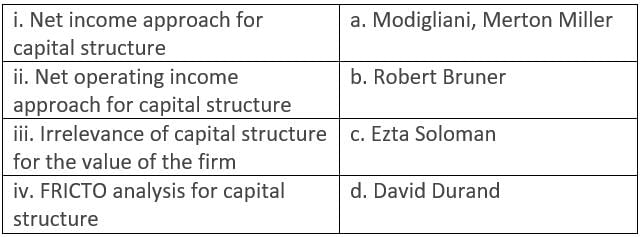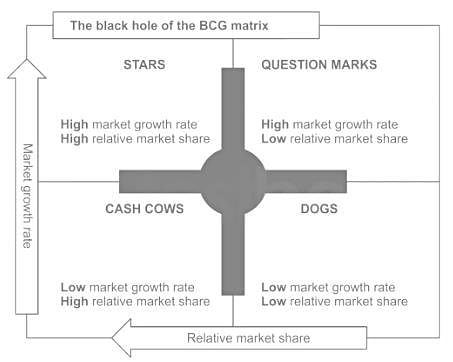TS SET Paper 2 Mock Test - 4 (Management) - TS TET MCQ
30 Questions MCQ Test - TS SET Paper 2 Mock Test - 4 (Management)
Name the author of Equity Theory of Motivation.
| 1 Crore+ students have signed up on EduRev. Have you? Download the App |
Which one of the following is related to control function of the financial manager?
_______ is an economy system based on principle of free enterprise.
The independently owned businesses or units that take title to the merchandise they handle are known as
Which is not the need as proposed by Abrahm Maslow?
The marketing communications strategy of the marketing mix deals exclusively with:
In marketing context, BCG matrix stands for_______
Long run equilibrium price of a perfect competitive firm is always
For the following items in List - I and List - II, indicate the correct code after matching them:

According to Graicuna's formula of span of management, if a superior has three subordinates, what number of cross-relationships would be there?
In which one of the following situations is a product-oriented layout appropriate?
Manager Inventory Chart, also known as replacement chart, is used in Replacement Planning of human resource management in an organization. Which of the following is not an advantage of Manager Inventory Chart?
If an imperfectly competitive firm is producing a level of output where marginal cost is equal to marginal revenue, marginal revenue is below average variable cost, and price is equal to average total cost, then the firm is :
Production manager of a manufacturing organization is trying to determine how to revise the production department, so that it can produce more units per day and achieve the targets in a specified time. Identify the managerial function.
Who proposed the 'value chain' as a tool to identify customer value?
Selection is the process in which candidates for employment are divided into two classes - those who are to be offered employment and those who are not. Who stated this?
Among the following financial derivatives, which involves the least risk for the holder?
Which of the following is not an application of perception in organization?
Which one of the following statements are the advantages of the Decision Support System (DSS)?
With n attributes the total number of ultimate frequencies are
A 'dumb terminal' essentially consists of
The term ''Grapevine Communication'' is related to:
Indicate the statement which is not correct:
i. Credit risk is loss on account of default of repayment of loan.
ii. Liquidity risk is the risk on account of the mismatches of cash inflow and outflow in a firm.
iii. Basic risk is the risk in a firm owing to the differences in the index to which financial assets and liabilities are tied up.
iv. Forward rate agreement is a contract where a borrower/lender locks the interest rate and protects itself from the loss on account of change in the future interest rate.
Statement I: PERT is an event-oriented technique.
Statement II: CPM is a task-oriented technique.
Choose the correct option from those below:
_______is the process of making and keeping customers and maximizing their profitability, behaviors and satisfaction.
Which of the following statements is correct about Entrepreneurship Development Institute of India?
Consider the following statistical tests :
(i) ‘F’ test
(ii) ‘t’ test
(iii) ‘z’ test
(iv) ‘Chi-square’ test
Which of these are parametric tests?


















